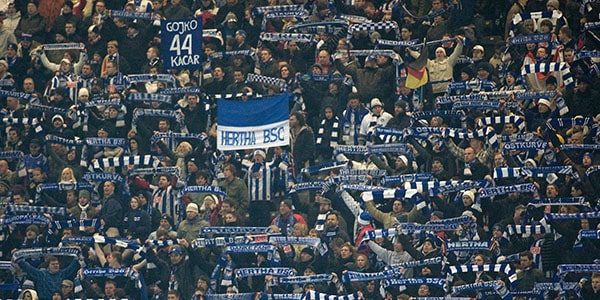
Photo by Colin McPherson/WSC Photos
By train, plane or Autobahn, fans from across Europe will arrive in Germany this summer to sample a matchday culture that’s still to be envied
By Ian Plenderleith
June 14, 2024
While football’s relentless globalisation means there are no longer stereotypical playing styles that we can stick like labels on individual nations, fan culture still varies wildly in different parts of the world. Germany, for example, is consistently revered as a land where terrace tradition has been upheld like it’s some kind of religious ritual from the biblical age. Standing doesn’t need to make a comeback here because it never went away.
The collective power of the German fan was demonstrated again this past season when mass protests led to the German Football League (DFL) dropping plans to allow outside investors to buy into the licensing for their TV and streaming rights. Fans suspected the investors would soon be pressing the DFL for a wider spread of kick-off times. A concerted campaign of tennis ball activism prompted the pushback, just as it had in 2018 in forcing the abolition of Monday night games.
Ticket prices are also still within a range that’s highly affordable at the lower end. On average, a top-flight season ticket in a standing area for the 2023-24 season cost €205 (£175). At Bayern Munich it was €165 – less than €10 per game – while the cheapest season ticket sitting down at their Allianz Arena would only set you back €385. This has helped to keep the Bundesliga’s fan base relatively young and highly vocal. There is also a noticeably greater proportion of female fans compared to 30 years ago.
This doesn’t mean that commercialisation has not affected the domestic game. Although 3.30pm kick-offs on Saturday are sacred in theory, this is at most the starting point for five out of the nine games – the others are on Friday and Saturday evenings, and Sunday afternoons. If you’re late getting a ticket for a nearly sold out game, you may end up paying €60-70. That’s almost at the Premier League level that many Bundesliga club executives look to with a wistful sigh and a flutter in their stomachs.
What do you get for your probably cheap ticket? The impressive choreographies instigated by various ultra factions can be as affecting as the atmosphere generated by their chants. It genuinely prickles the skin, and in favourable conditions even the most reserved supporters will find themselves standing up to sing their lungs out in unison with a choir of thousands. This season I saw Eintracht Frankfurt come from behind to win three times, in part bellowed on to victory by the noise and conviction of their entire 58,000-strong support. The 12th man cliche perseveres.
“No wonder, they’re all drunk,” one young visitor observed to me, attending her first German game. It’s true that several beers to wash down the obligatory stadium bratwurst is still a huge part of the matchday ritual. Pockets of obnoxious behaviour from too many Pilsener prove that the modern game has not been completely sanitised, even as staggering, catatonic inebriation has become increasingly out of place. In reality, there’s no real longing for the all-male 1970s when violence, vomit, sweat and piss were staples of the borderline anarchy in largely unregulated stadiums.
The less abrasive tone in stadiums is perhaps best reflected in the dropping of the “arsehole” ritual. The home team is still read out over the PA system by first name just before kick-off, with the fans celebrating their heroes by chanting every player’s surname. In previous eras, the away team was likewise announced, allowing the home fans to chant “Arschloch!” from numbers one through to 11. Nowadays, the away team is discreetly and courteously telegraphed long before kick-off, by full name only. Arguably regrettable, but probably for the best.
In fact being an ultra nowadays requires more of a tendency to discipline than rebellion. If you stand on the terraces, you’ll be frowned at or chastised if you don’t sing along, or join arms to dance up and down at the direction of the capitano perched on the fence. No selfies or videos, this is not a tourist zone. A righteous stance against all that is evil – the German FA, the DFL and Bayern Munich, for example – is a given. There are many in the stadium who bask in the noise that comes from the more fanatical sections, but we don’t want to be in the thick of it.
How much of this scene will fans experience when they come to Germany for the Euros? Not much at all, because club takes a clear priority over country. The national team support is family oriented, more dachshund than Alsatian. When Northern Ireland came to Frankfurt for a Euros qualifier in 2019, their raucous, bacchanalian supporters sang for 90 minutes, despite losing 6-1. From the home crowd there was barely a squeak, apart from polite applause for the goals and some pointless parping from a since abolished oompah band that was the German FA’s lamentable attempt to create a vibe.
Nonetheless, if Germany can continue their revival under Julian Nagelsmann, there will be more of a roar, even from the overpriced sections. At the March home victory against the Netherlands that followed an excellent win in France, the crowd was conspicuously more involved and animated for a friendly against a strong opponent than it had been for the casual stroll against Northern Ireland. When you’ve won as many titles as Germany, das Volk won’t stand up and cheer for anything but the best.
This article first appeared in WSC 443, June/July 2024. Subscribers get free access to the complete WSC digital archive
Want to see your writing published in WSC? Take a look at our pitching guide and get in touch
Tags: European Championship, Germany
